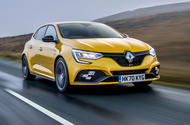Update brings interior improvements – but also makes a dual-clutch automatic your only gearbox option
This is the latest version of the Renault Mégane RS Trophy, a car whose continued existence we should celebrate however it’s been achieved in a European market that’s increasingly hostile to so many performance cars.Once so famously the cradle of the hot hatchback, the French car market has become one that, due to tightening emissions taxation, several hot hatch-centred performance brands are now avoiding entirely. You can no longer buy the Hyundai i30 N in France, and while you can still buy the Audi RS3, you will pay the equivalent of £23,000 in ‘malus’ emissions tax just to get it out of the showroom. Fancy a Ford Mustang V8? That will be £26,500, monsieur. Insert your own insultingly generic Gallic term of exclamation here.For Renaultsport, whose biggest market is now its domestic one, the upping of the first-year tax burden on its Mégane RS to as much as the equivalent of £8000 will certainly be challenging. But for now at least, it’s pressing on as best it can.That means, although it may seem drastic to us Brits, they’ve deleted the manual version of the car for the latest model year. While the dual-clutch automatic may only be a handful of grams more CO2-efficient, in France that’s a difference that might effectively save people thousands.The updated hot Mégane also gets new headlight and tail-light designs, a new infotainment system and a new instrument display, but no changes have been made to its mechanicals, save for the aforementioned gearbox deletion, and for one other: both standard RS and RS Trophy models now use the higher-powered 296bhp version of Renault’s 1.8-litre engine with its ball-bearing-born turbocharger. One less reason to spend big on the Trophy version, then? Well, perhaps, but there are still others. After a simplification of the range, you now have to buy a Trophy to get the firmed-up Cup suspension; but if you do, you also get an active sports exhaust, 19in wheels, a Torsen slippy diff and a front brake upgrade, none of which are available on the softer-sprung RS 300.
Source: Autocar
